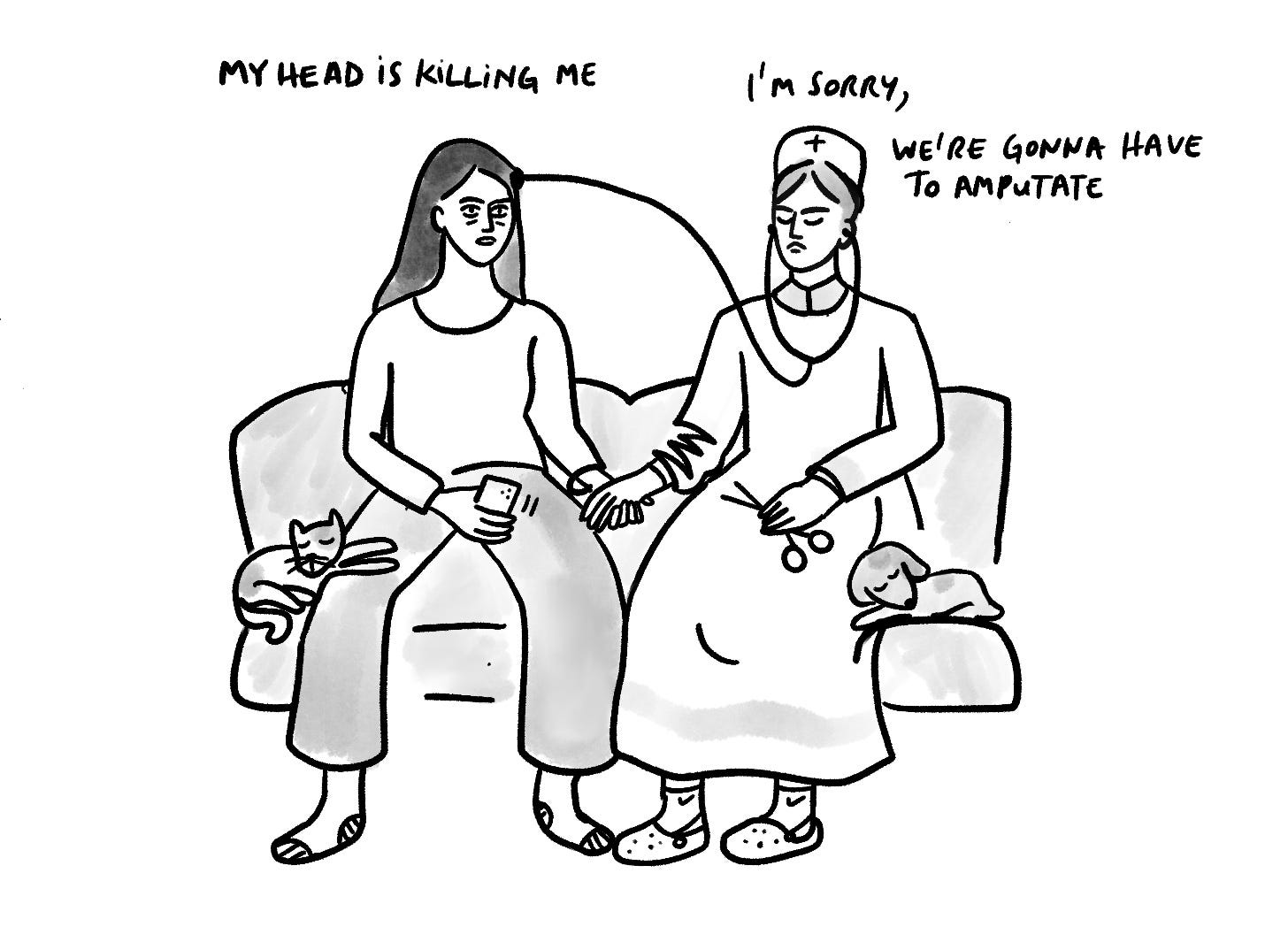The medical vernacular of work problemsThe clinical words and phrases we use to talk about our careers add up to a language of painWelcome to A-Mail, a newsletter about how our careers make us feel – written by me, Anna Codrea-Rado. If you like these posts, a practical way to support my work is to consider becoming a paid subscriber. A decade ago, when I was still a cub reporter, one of my first feature assignments was to write about business jargon. My editor wanted 800 words on how until the 1990s, the phrase “business models” wasn’t a thing. My reporting took me on a whistle-stop tour of the idiosyncrasies of corporate buzzwords. When we think about the language of business, jargon is what usually first comes to mind. An Orwellian business-speak that feels awkward in your mouth (let’s table this and share our key learnings async!) and makes you cringe as you say it. It’s what the author of the memoir Uncanny Valley, Anna Wiener, calls “garbage language”. In a brilliant essay on garbage language, the journalist, Molly Young, wrote that it “permeates the ways we think of our jobs and shapes our identities as workers. It is obvious that the point is concealment; it is less obvious what so many of us are trying to hide.” Garbage language is the way we talk while at work, but there’s also a distinct vernacular we use to speak about work. We suffer from imposter syndrome, burnout, and even work addiction. We navigate clinical-sounding challenges in the workplace, like parasocial relationships, decision fatigue and groupthink. HR departments administer personality tests to determine if we’re introverts or extroverts. We pathologise bosses, referring to them as toxic or even narcissists. When we lose a job, we grieve it. Our jobs can flatline; we attempt to resuscitate them in career clinics, coaches and counsellors. We listen to How’s Work, Esther Perel’s podcast that’s like couples therapy, but for people in a work crisis. These words and phrases add up to a clinical vernacular of work, and more specifically our problems with it. Encoded in this medical language is pain; an expression of the discomfort – and even suffering – we feel in the workplace and in our careers. Many of these terms come directly from academia, where researchers study work’s physiological and psychological impact on us. But some of the vocab is pseudo-scientific, invented by writers like me who are trying to find the right words to capture the hard-to-describe feelings work can bring up for us. Its use can be clunky and not everyone likes it, but it nonetheless tells us some important about contemporary work culture – that it hurts us. When I asked the group chat whether anyone had noticed themselves using clinical language to describe their work problems, one of my friends told me about experiencing the Tetris Effect. As a teenager, on the nights after she’d worked her weekend job at a newsagent, she see images of customers in her half-sleep and hear the ding of the cash register. It wasn’t quite a dream, because it would happen just as she was drifting off. It was only years later that she learned there was a term for what she’d experienced: the Tetris Effect. After conducting a series of experiments, Harvard psychiatrist Robert Stickgold found that after hours of playing Tetris, people would see afterimages of the colourful squares slotting into place. This phenomenon has since been found to turn up in a range of other repetitive tasks, from rock climbing to filling in spreadsheets or say, working at a cash register. My friend was relieved to have an explanation. “It was a real ‘Oh that's what that feeling was!’,” She said. “I thought it was just me. I was fascinated to find out (years later) that it was A Thing”. I thought it was just me is exactly how I felt when I discovered “email apnea”. This is a condition in which you unconsciously hold your breath while checking your inbox. Finally, a legitimate-sounding explanation for why I get disproportionately worked up when I’m dealing with email. And yet, email apnea wasn’t discovered in a scientist’s lab, but rather by Linda Stone, a former Apple executive after she noticed her own breathing pattern changed every time she went into her inbox. Does it matter that this is pseudo-science? I don’t think so. Firstly, a lot of the disdain towards pop psychology is more often than not just snobbery. Just because something hasn’t been researched in an academic setting, that doesn’t mean it doesn’t merit study. Yes, those findings won’t have been peer-reviewed and should be understood as such, but they can be a helpful starting point for working something out. And if nothing else, the ability to give a name, even an imperfect one, to something previously intangible is deeply powerful. This is evident in the “This Is The Word For What You’re Feeling” articles that went viral at various points in the last two years. Right at the beginning of the pandemic, the Harvard Business Review published an interview with the thanatologist David Kessler with the headline, “That Discomfort You’re Feeling Is Grief”; shortly after that, we learned that Zoom fatigue was the culprit for our tiredness on calls; and then last summer, organisational psychologist Adam Grant, told us that blah feeling we had was called languishing. We collectively lapped these pieces up because, let’s face it, lots of we don’t always know what we’re feeling and or have the right words for an obscure experience. It’s helpful to be pointed in the right direction sometimes. And when that Thing sounds vaguely medical, because it has the word “syndrome” or “effect” in it or the op-ed’s author is a professor, that gives it that much more stock. Because the reality is, our culture grants more validity to afflictions when they’ve been diagnosed by a professional – or at least sound like they could have been. It’s worth pointing out that plenty of people don’t like the medical way in which we talk about work. When I coined the phrase productivity dysmorphia to describe an inability to see one’s own success, the main piece of critical feedback I got was that it sounds was too clinical.   When I interviewed Malissa Clark, associate professor of industrial and organizational psychology at the University of Georgia, I was fascinated to hear that she – a person who studies work addiction and workaholism for a living – finds the terms too clinical. This is partly down to a common misunderstanding on the part of journalists about the work of organisational psychologists: She studies the psychology of work addiction, but she can’t diagnose you as a work addict. (It’s worth pointing out here that neither work addiction nor burnout is listed in the Diagnostic and Statistical Manual of Mental Disorders as a mental health condition; however, many critics now consider the over-reliance on the DSM to be an outdated approach to psychiatry). Clark told me: “Burnout, workaholism, and emotional labor are all multidimensional concepts that are measured as such and are linked to important outcomes for individuals, their families, and organizations, according to decades of research from the research literature.” She said, and I agree, that for better or worse, these are the terms we use and trying to change them now would it be even more confusing. What Clark did caution against, however, are jingle-jangle fallacies. This is the use of the same term for different concepts (jingle) or different terms for the same concept (jangle). A good example of a jingle fallacy is how mental load and emotional labour are often treated as the same concept when they’re in fact different. And you could, maybeee say my productivity dysmorphia phrase skates a little close to a jangle fallacy. Indeed, when I interviewed Amelia Nagoski, co-author of Burnout: Solve Your Stress Cycle, for my productivity dysmorphia piece she said what I was describing was one of the signs of burnout. As I wrote in the piece, she said that there already was a term for the tendency to negatively evaluate the worth of one's work: "decreased sense of accomplishment”. Still, I stand by my use of the term productivity dysmorphia. Firstly, I was trying to describe something that felt, to me at least, distinct from burnout. What I was trying to capture was a perception problem; an inability to see what was in front of me. It’s a heavy term because there’s a heavy feeling attached to it. Examining whether it’s appropriate to use medical language to talk about work problems pulls you into some dicey territory. You quickly find yourself in the middle of the medicalisation critique. Doctors, journalists, and scholars have been expressing concern about turning everyday issues into illness since the middle of the 20th century. As Adrian Massey, an occupational physician and the author of Sick Note Britain, wrote in the Guardian:
And because what we’re talking about here is language, you also butt up against another heated issue: its (im)proper use. Here you’ll find prescriptives (people who focus on how language should be used) locking horns with descriptives (those who focus on how language is being used). And suddenly this has all become very fiery. Personally, as far as the issue of who gets to decide what words mean, I’m a fan of the Economist’s language columnist Lane Greene’s argument that language is the ultimate self-regulating system. In light of this, maybe rather than focus on the misuse of medical terms, a better question might be: what are we trying to express by using this language? What are we really saying when we use words you’d usually find in the doctor’s office in, well, the office? Let’s briefly revisit what Molly Young wrote about garbage language:
We gravitate towards clinical words when describing work problems because we're trying to communicate the various ways degrees of suffering we feel in our jobs. And when we either don't have or don't know a better way to express that discomfort, we end up using pseudo-science. After all, what does medical language encode if not pain? The WHO estimates that roughly 2 million people are killed by their job every year around the world. The leading cause is not injuries sustained on the job, but rather working long hours. Then there’s the psychological injury work causes us. Studies have shown that toxic workplaces, characterised by bullying, harassment and incivility, not only negatively impact worker productivity, they’re also linked to increased rates of depression and insomnia. What’s harder to find research on, but most of us know to be true, is the nuanced and confusing ways in which work causes us discomfort. Our careers are one of the primary ways in which we develop our identities. If your relationship with work becomes rocky, it can shake your entire sense of self. Hidden in plain sight in the medical language of work is an attempt to say that work is hurting us. It might be jarring to hear this language, but it’s important to listen to what it’s telling us. You’re a free subscriber to A-Mail. For the full experience, become a paid subscriber. |





No comments:
Post a Comment